The Unexpected Twists and Turns of a Liver Detox: Exploring Potential Side Effects
The human liver, a tireless workhorse, filters toxins from our blood, metabolizes medications, and performs countless other vital functions. When we hear the term "liver detox," images of vibrant health often spring to mind. But the reality is a bit more nuanced. While supporting liver health is crucial, the idea of a "detox" often carries misconceptions and can, in certain circumstances, lead to unexpected side effects. This isn't to say that all liver cleansing methods are harmful; rather, it's a call for informed choices and a realistic understanding of the process.
My journey into this topic began with a personal experience. A friend, eager to improve her well-being, embarked on a rigorous liver detox program that involved restrictive dieting and numerous supplements. The results weren't what she expected. Instead of feeling energized and healthy, she experienced a range of uncomfortable symptoms, sparking my interest in understanding the potential downsides of these programs.
This exploration led me down a rabbit hole of research, uncovering a complex interplay of factors influencing liver health and the potential side effects of detoxing. Let's delve into the specifics.
What are the common side effects of liver detox?
Many advertised liver detox programs promise miraculous results, often overlooking the potential downsides. Common side effects can include:
- Fatigue and Weakness: Restrictive diets often deprive the body of essential nutrients, leading to fatigue. This is particularly true when eliminating entire food groups.
- Headaches and Dizziness: These can result from dehydration, nutrient deficiencies, or the withdrawal of caffeine or other substances.
- Nausea and Vomiting: Some detox programs involve consuming substances that can upset the stomach, leading to nausea and vomiting. This is particularly a risk with herbal remedies or cleanse drinks which haven't been properly tested.
- Diarrhea: Changes in diet can significantly impact bowel movements, leading to diarrhea.
- Muscle Cramps and Pain: Electrolyte imbalances, often caused by dehydration or restrictive eating, can trigger muscle cramps and pain.
Are there serious side effects to worry about?
While many side effects are relatively mild and temporary, some detox methods can lead to more serious consequences:
- Liver Damage: Ironically, some detox programs can actually damage the liver, especially those involving potentially harmful substances or extreme dietary restrictions. The liver is remarkably resilient, but it's not invincible.
- Drug Interactions: Certain herbal remedies promoted as liver cleansers can interact negatively with medications, potentially diminishing their effectiveness or causing harmful side effects. Always consult your doctor before starting any detox program, particularly if you are on medication.
- Nutrient Deficiencies: Highly restrictive diets often lack essential vitamins and minerals, leading to various health problems. A balanced diet provides the best support for liver function.
- Gallstones: Some detox programs can trigger the formation of gallstones, leading to severe abdominal pain and requiring medical intervention.
What are the best ways to support liver health naturally?
Rather than relying on drastic detox programs, focusing on healthy lifestyle choices is the most effective way to support liver health. This includes:
- Maintaining a Balanced Diet: Consume a diet rich in fruits, vegetables, and whole grains.
- Staying Hydrated: Drinking plenty of water helps the liver flush out toxins.
- Regular Exercise: Physical activity promotes overall health and can indirectly support liver function.
- Limiting Alcohol Consumption: Excessive alcohol consumption significantly strains the liver.
- Avoiding Toxic Substances: Minimize exposure to environmental toxins and harmful chemicals.
How can I tell if my liver needs detoxing?
The notion of a "liver detox" is often misleading. Your liver is constantly working to cleanse your body. If you suspect liver problems, consult a healthcare professional for proper evaluation and diagnosis. They can perform blood tests to assess your liver function and recommend appropriate treatment if necessary. Self-diagnosing and engaging in potentially harmful detox programs without medical supervision is risky.
What are some natural ways to improve liver function?
Supporting liver health naturally revolves around a holistic approach, not a quick fix. This involves adopting a healthy lifestyle, encompassing aspects previously discussed, such as balanced nutrition, regular exercise, hydration, and responsible alcohol consumption. Certain foods, like cruciferous vegetables (broccoli, kale, etc.) and foods rich in antioxidants, may also indirectly contribute to supporting overall liver health.
In conclusion, while the concept of a liver detox holds a certain allure, it's essential to approach it with caution. Prioritizing a healthy lifestyle, focusing on balanced nutrition and avoiding harsh or potentially harmful detox methods, are far more effective and safer ways to support your liver's natural ability to cleanse and function optimally. Always consult your doctor before making significant changes to your diet or starting any new health regimen. Your liver, and your overall health, will thank you.

